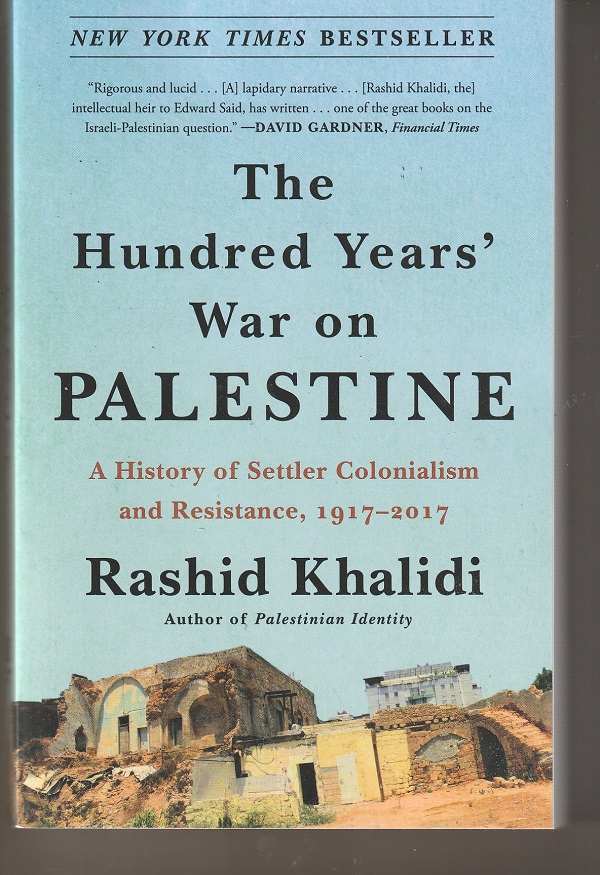As someone who didn’t know many of the details of the battles and wars between Israel and the Palestinian people over the past century and more, I came to Rashid Khalidi’s 2020 book The Hundred Years’ War on Palestine: A History of Settler Colonialism and Resistance, 1917–2017 looking for an objective overview.
The book, however, is a highly partisan account from the Palestinian perspective.
In The Hundred Years’ War on Palestine, Khalidi is making a case for his people in the court of public opinion, and it seems clear from the many blurbs on the cover of the paperback that his is a useful and important book for those who are well versed in all that has gone on in the century-long fight and all that has been written about it.
I don’t have that background, and, on virtually every page, I felt I was only getting a portion of the story. I was constantly trying to guess at what an Israeli historian would say about what Khalidi was saying. Or, even better, what a neutral historian would say.
 I didn’t know enough to fit what Khalidi was saying into context. But I knew that what he was saying was leaving out a lot, such as what an Israeli historian or neutral historian would say in response, well, to everything he has to say.
I didn’t know enough to fit what Khalidi was saying into context. But I knew that what he was saying was leaving out a lot, such as what an Israeli historian or neutral historian would say in response, well, to everything he has to say.
For Khalidi, Palestine has been colonized by Zionists with the help of world powers — Great Britain first and then the United States — and the Palestinians have been treated like non-people. Indeed, in his conclusion, Khalidi argues that there are strong comparisons between the way Native Americans were treated by the colonial powers and by the newly minted United States and the treatment of Palestinians.
By that point, my head was spinning although, to be honest, my head was spinning during the entire book.
Khalidi makes the argument that Palestinians have been victimized since the early 1900s. I’m not sure how that fits with the violence and terrorism that Palestinians have carried out over the past century. He rarely mentions that violence and terrorism, except in the late pages when he criticizes the suicide-bombers of Hamas and other Palestinian groups, mainly as a bad strategy.
And even when he mentions that violence and terrorism, Khalidi argues that Israel did much worse, always did much worse, that Israel was an oppressor with a highly skilled military, that Israel was a bully.
Yet, I was left wondering how Israel was able to organize itself and create a unified front to the Arab world once the new nation was established. I was left wishing for context, for an objective look at both sides, at why Israel was able to unite despite its internal political differences and why the Palestinians, it seems, have been, seemingly forever, at each other’s throats.
In fact, I came away from this book with the sense that the Palestinians may be one people in terms of culture and language but they certainly haven’t been one people in trying to accomplish a satisfactory political end to this conflict with Israel.
Khalidi’s book reports in many places how the Palestinian hopes were damaged or dashed because one Palestinian group couldn’t get along with another, because there was seemingly a deeply ingrained inability to get along to accomplish a common goal.
Having read the book, I don’t trust my reaction to Khalidi’s arguments. That’s because I don’t have a decent amount of information and insight to put what he says into perspective.
He might be more right than I realize. Or more wrong.
Patrick T. Reardon
4.19.24
Written by : Patrick T. Reardon
For more than three decades Patrick T. Reardon was an urban affairs writer, a feature writer, a columnist, and an editor for the Chicago Tribune. In 2000 he was one of a team of 50 staff members who won a Pulitzer Prize for explanatory reporting. Now a freelance writer and poet, he has contributed chapters to several books and is the author of Faith Stripped to Its Essence. His website is https://patricktreardon.com/.

Just wanted to say that I really respect the viewpoints I’ve seen here; just came by from another unrelated article. Well, as it turns out, the Palestinians are the actual, modern day Philistines, and the Jews as we know them are the descendants of Judea, the SOUTHERN kingdom of Israel.
But the Danes are from the tribe of Dan, the Goths are from the tribe of Gad. The Jutes are from the tribe of Judah, and the name “Saxons” is literally an abbreviation for “Isaac’s sons,” and the world is FULL of Israel’s scattered tribes.
When the Arab world chants “death to America,” lumping in Great Britain with the United States, they are actually expressing their hatred for whole of Israel, Great Britain and the United States being primarily the children of Joseph: “Ephraim and Manasseh,” prophesied to become the greatest of people and nations by Jacob in Genesis 48 and 49.